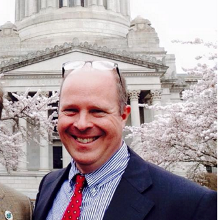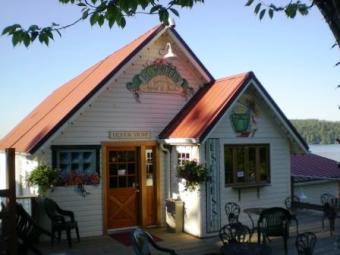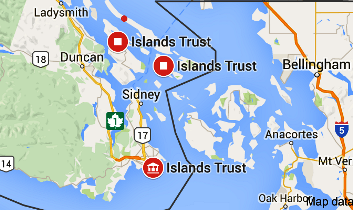— by Margie Doyle —
The San Juan County Council will next meet on Tuesday, Jan. 5, 2016 and after a year of achievements, Council Member Rick Hughes foresees a “big infrastructure year ahead.”
Some of the projects ready for the shovel next year are:
- the Prune Alley streetscape plan for stormwater, curbs, sidewalks and gutters;
- the Deer Harbor bridge;
- Orcas Road modifications;
- the Park-and-Ride lot at the Orcas Ferry Landing_, to the north of the current ferry holding lanes.
In related developments, the State Department of Transportation (WSDOT) ferries system (WSF) has signed a lease to take over the county building at the landing that has been a retail store in recent years, and modify it as a passenger terminal. The three small buildings to the north of the landing road will be removed, with a traffic turnaround planned for the space.
Miscellaneous mooring projects will use $60,000-plus beginning in January when county staff will meet to discuss the buoys. “I’d like to have five or six test buoys at various county locations next year,” said Hughes, noting that placement of the buoys still needs to go through the pubic process. Funds for the buoys comes as a result of Hughes’ work with the state legislature last year to allow public works funds for marine facilities.
The “Fern Street Extension” lot across the street from the Eastsound Village Green will once again be open to public access with a pathway. The property was purchased with County Public Works funds and has been the subject of numerous public meetings about its use, particularly through the monthly Eastsound Planning Commission meetings.
The County and the Lummi Tribe recently signed a law enforcement agreement regarding Madrona Point at the south end of Haven Street in Eastsound. The county will patrol the area for vandalism and littering. Madrona Point was a traditional Lummi burial ground, and the Lummi Tribe and the county entered into an agreement in 1990? to preserve it from commercial development.
Hughes said, “The agreement is an opportunity to show we respect and protect tribal assets there. It’s a good time to start up that conversation again.”
The County Council and staff are also working to install public showers such as the ones already in operation in Lopez Village and Friday Harbor. Island Resource Centers and faith-based organizations are coordinating how to provide better access in more streamlined fashion, said Hughes. Of particular concern are tourist season workers who may be “struggling for some kind of shower facilities in the center of town.”
The increase in tourism and its attendant increase in transient lodging, particularly through sites such as VRBO (Vacation Rentals by Owners) and Air BnB has been a matter of concern to island residents, property owners and county staff for several years. The County Council has agreed that “any entity that receives lodging tax revenue is required to have on file with its local chamber its [state business license number] (UBI) and county transient lodging permit.” Annual fire inspections and five-year permit renewals will be required with the county permit.
As part of the council regulations, the county Assessor’s Office is authorized to check the county GIS map against the local VRBO map listing transient rentals. A letter requesting that non-compliant rentals meet county regulations will be sent prior to releasing the information about those entities to the Department of Revenue.
Hughes notes that the County Visitors Bureau was assigned $12,000 each to the Lodging Tax Fund for the Lopez, Orcas and San Juan Island Chambers of Commerce.
Plans to advance international tourism and commerce are also part of the 2016 agenda, Hughes says, as the County Council is in discussion with Islands Trust, the Canadian Gulf Islands Economic Development Council, to arrange for direct boat shuttle from the Gulf Islands to the San Juan Islands. Direct flights from Friday Harbor to Canada are also being negotiated with the TSA, Homeland Security and legislative representatives.
In 2016, the Washington State Legislature is scheduled to have a short, 60-day session. San Juan County Council looks forward to working with the legislature to better coordinate oil spill responses, opposition to the expansion of natural resource shipments, and lobby for improvements to public education in line with the State Supreme Court’s McCleary decision and legislative sanctions.
Locally, the Council hopes to get the Shoreline Master Program update passed in January.
Hughes maintains a council office at the Orcas Senior Center (call to make an appointment) and reports regularly to the EPRC on the first Thursday of each month. He welcomes questions and concerns and may be contacted at phone number at 360-472-0253 and by email at rickh@sanjuanco.com
**If you are reading theOrcasonian for free, thank your fellow islanders. If you would like to support theOrcasonian CLICK HERE to set your modestly-priced, voluntary subscription. Otherwise, no worries; we’re happy to share with you.**











Nice year-end report and prospects for improvements next year. Question: will the Russell Store be re-purposed with the same footprint and exterior? It is a very sweet building, if if constructed more than 50 years ago, perhaps with historic significance. It certainly contributes to the ambiance of the area. Best wishes for the new year.
Is Madrona Point still closed, contrary to the terms of its purchase? How many years has it been?
What are the Orcas Road modifications ?
Hi Henry, you can review the plans and discussions by typing in “Orcas Road” in the search bar at the upper right hand side of the Orcas Issues site. You’ll find six articles covering the Orcas Road changes just in this year alone. By the way, this search feature is a great way to get comprehensive background on our stories. (It’s best if you put quotation marks around your search term, and if you type a space after the final quotation mark)
Hi Peg! Actually, the Terms include the option to close it at the Tribe’s discretion. That is an oft overlooked, (by Islanders)provision in the Agreement.
Spirit Eagle
Henry Parsons Public Works is “straightening” the road along the Nordstrom Lane curve. Whether we want it or not. (Sorry, it’s just that they seem to be paving over everything.)